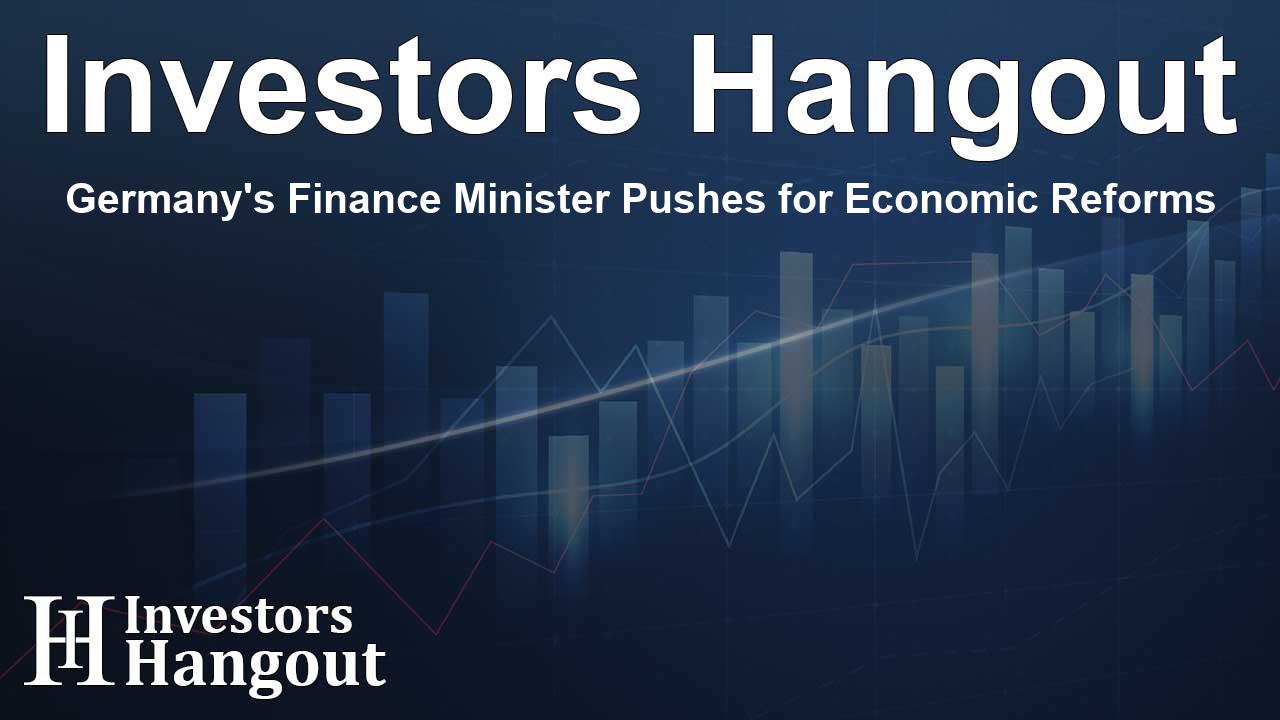Germany's Finance Minister Pushes for Economic Reforms

Germany's Finance Minister Advocates for Economic Reforms
The recent proposals from Germany's finance minister have stirred significant conversations about the country's economic future. The finance minister is advocating for tax reductions and maintaining fiscal discipline, presenting a stance that directly contrasts the investment strategies put forth by the economy minister. This intra-coalition debate highlights deeper ideological rifts within the governing coalition.
Key Proposals in the Policy Paper
Christian Lindner, leading the Free Democrats (FDP), which plays a crucial role in Chancellor Olaf Scholz's coalition, emphasizes the necessity for a comprehensive economic shift. In an insightful 18-page policy document, he calls for significant revisions to existing economic policies, aiming for a revitalized economic landscape.
Confrontation Amidst Coalition Tensions
The growing discord over economic and industrial priorities suggests potential instability within the coalition government. The rivalry between the FDP, the Greens, and the Social Democrats is particularly pronounced with a crucial election approaching, stirring public speculation about the coalition's future.
Investment Plan vs. Tax Cuts
By positioning himself against the recent multi-billion-euro investment proposal from Economy Minister Robert Habeck—widely viewed as a future candidate for Chancellor—Lindner sought to bring his priorities to the forefront. Habeck's plan aimed to stimulate growth by circumventing Germany's stringent fiscal constraints through the establishment of a dedicated investment fund.
Tax Cut Proposals from Lindner
In his policy paper, Lindner makes a strong case for tax cuts intended to rejuvenate the economy. A notable suggestion includes the immediate abolition of the solidarity surcharge, a tax implemented post-reunification designed to assist the economically weaker eastern states of Germany.
Regulatory Halt and Environmental Standards
Alongside these tax reduction proposals, Lindner is also pushing for a freeze on new regulations and is critical of what he terms overly ambitious climate standards. His reasoning focuses on creating a more favorable environment for economic growth without imposing additional burdens on businesses.
Reallocation of Investment Funds?
In a significant economic context, Lindner also highlights the decision to eliminate €10 billion (approximately $10.86 billion) in budgetary subsidies. This decision comes following the pause of a semiconductor project initially linked to Intel (NASDAQ: INTC). Lindner's perspective challenges the narrative set by Habeck, who indicated previously that these funds could be repurposed for other investments.
Implications of the Proposals
The propositions set forth by Germany's finance minister indicate a transformative moment for the nation's economic policy. As debates unfold, the country's stakeholders must balance fiscal prudence with the need for investment and growth during challenging economic times.
Frequently Asked Questions
What are the key proposals made by Germany's finance minister?
The finance minister proposes tax cuts, halting new regulations, and scrapping certain subsidies to stimulate the economy.
How do these proposals affect the coalition government?
The proposals highlight significant ideological differences within the coalition, intensifying public concern about its stability going forward.
What is the stance of the Economy Minister on these proposals?
The Economy Minister has advocated for a substantial investment plan aimed at bolstering economic growth, which contrasts with the finance minister's focus on tax cuts.
Which tax is proposed for elimination by Lindner?
Lindner calls for the immediate end of the solidarity surcharge imposed on income and corporate taxes to ease financial burdens.
How might the reallocation of funds impact future projects?
Pending adjustments to the budget could affect how funds are utilized, especially concerning innovative sectors like semiconductors.
About Investors Hangout
Investors Hangout is a leading online stock forum for financial discussion and learning, offering a wide range of free tools and resources. It draws in traders of all levels, who exchange market knowledge, investigate trading tactics, and keep an eye on industry developments in real time. Featuring financial articles, stock message boards, quotes, charts, company profiles, and live news updates. Through cooperative learning and a wealth of informational resources, it helps users from novices creating their first portfolios to experts honing their techniques. Join Investors Hangout today: https://investorshangout.com/
Disclaimer: The content of this article is solely for general informational purposes only; it does not represent legal, financial, or investment advice. Investors Hangout does not offer financial advice; the author is not a licensed financial advisor. Consult a qualified advisor before making any financial or investment decisions based on this article. The author's interpretation of publicly available data shapes the opinions presented here; as a result, they should not be taken as advice to purchase, sell, or hold any securities mentioned or any other investments. The author does not guarantee the accuracy, completeness, or timeliness of any material, providing it "as is." Information and market conditions may change; past performance is not indicative of future outcomes. If any of the material offered here is inaccurate, please contact us for corrections.









